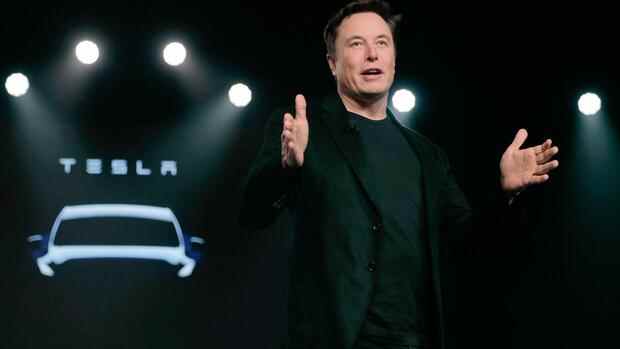The Tesla boss understood earlier than others that semiconductor supplies are strategically important for car manufacturers.
(Photo: dpa)
It has been reading for years: Cars are becoming computers on wheels, smartphones on four wheels. But traditional car manufacturers have so far not lived that much. This can be seen in the chip crisis, which is forcing numerous brands to stop production. The electric car pioneer Tesla is also suffering from the shortage, but to a much lesser extent. The delivery record in the third quarter speaks for itself.
How can that be? The company led by Elon Musk sees itself more as a technology group than as a car manufacturer. This not only includes software updates, which of course are uploaded wirelessly, but also a high level of semiconductor expertise. Tesla works very closely with chip manufacturers, designs its own semiconductors and has them manufactured by TSMC or other manufacturers.
Developing your own is risky and costs a lot of money. But technological expertise pays off in times of crisis and gives Tesla more flexibility. In this way, the company can rewrite the software and firmware and convert chips when things run out.
The situation is completely different for German manufacturers who only have indirect contact with chip manufacturers through their suppliers. That is about to change – but only after the child has fallen into the well.
Top jobs of the day
Find the best jobs now and
be notified by email.
You don’t have to exuberantly lift Tesla into the sky. As a still small and rapidly growing manufacturer, the US group is in a comfortable position. In order to be able to produce the increasing numbers, Tesla simply canceled fewer chip orders than the competition in the 2020 corona crisis.
The importance of chips continues to grow
Nevertheless, if the crisis shows anything, it is the importance of semiconductors for cars. In 2000, an average of $ 206 in semiconductors was in a car; last year it was $ 744, and the trend is rising. According to the industry association for the electronics industry, the value per vehicle is expected to rise to $ 1,050 by 2025.
Autonomous driving systems, better information technology, wireless software updates – more and more applications are turning the car into a computer. Semiconductors are one of them. Tesla has understood this for a long time, which pays off in the crisis. The competition takes painful notice.
More: New delivery record: What other manufacturers can learn from Tesla
